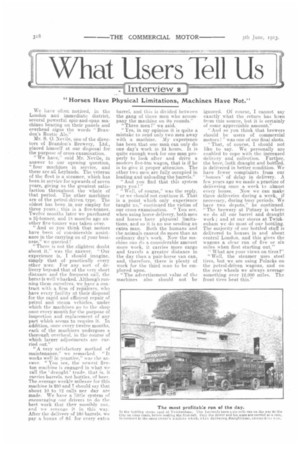"Horses Have Physical Limitations, Machines Have Not."
Page 22

If you've noticed an error in this article please click here to report it so we can fix it.
We have often noticed, in the London and immediate district, several powerful spic-and-span machines bearing on their panels and overhead signs the words "Brandon's Rustic Ale."
Mr. S. 0. Nevile, one of the directors of Brandon's Brewery, Ltd., placed himself at our disposal for the purpose of cross-examination.
"We have," said Mr. Nevile, in anawer to our opening question, " four machines in service, and these are all Leylands. The veteran of the fleet is a steamer, which has been in service for upwards of seven years, giving us the greatest satisfaction throughout the whole of that period. The other machines are of the petrol-driven type. The oldest has been in our employ for three years ; this is a five-tonner. Twelve months later we purchased 4-tonner, and 18 months ago another five-toimer was taken over.
"And so you think that motors have been of considerable assistance in the carrying on of your business," we queried?
"There is not the slightest doubt about it," was the answer. '' Our experience is., I should imagine, simply that of practically every other mei. For any sort of delivery beyond that of the very short distance and the frequent call, the horse is well whacked. Although running them ourselves, we have a contract with a firm of re6dirers, who have every facility at their disposal for the rapid and efficient repair of petrol and steam vehicles, under which the machines go to the shop once every month for the purpose of inspection and replacement of any part which seems to require it. In addition., once every twelve months. each of the machines undergoes a thorough overhaul, in the course of which larger adjustments are carried out."
"A very satisfactory method of maintenance," we remarked. "It works well in practice," was the answer. " You see, the newest fiveton machine is engaged in what we call the 'draught ' trade that is, it carries barrels, not bottles, of beer. The average weekly milea ue for this machine is 250 and T should say that about 10 to 12 calls per day are made. We have a little system of encouraging our drivers to do the best work that they noeeibly can. and we arrange it in this way. After the delivery of MO barrels, we pay a bonus of Eid. for every extra barrel, and this is divided between the gang of three men who accompany the machine on its rounds."
"Three men?" we said.
.4' Yes, in. my opinion it is quite a mistake to send only two men away with a machine. My experience has been that one man can only do one days work in 24 hours. It is quite enough work for one man properly to look after and drive a modem five-ton wagon, that is if he is to give it proper attention. The other two men are fully occupied in loading and unloading the barrels."
"And you find that this system pays you .?" " Well, of course," was the reply, "or we should not continue it. That is a point which only experience taught us," continued the victim of our cross-examination. " You see, when using horse delivery, both men and horses have physical limitations, and so it is no use sending an extra man. Both the humans and the animals cannot do more than an ordinary day's work. Now the machine can do a considerable amount more work, it carries more cargo and travels a greater distance in the day than a pair-horse van can, and, therefore, there is plenty of work for the third man to be employed upon.
"The advertisement value of the machines also should not be ignored. Of course, I cannot say exactly what the return has been from this source, but it is certainly of some appreciable amount."
'And so you think that brewers should be users of commercial motors ? " was one of our final shots.
"That, of course, I should not like to say. We personally are enabled to cope with the increased delivery and collection. Further, the beer, 'both draught and bottled, is delivered in better condition. We have fewer complaints from our 'houses' of delay in delivery. A few years ago we made a practice of delivering once a week to almost every house. Now we can make three deliveries during a week, if necessary, during busy periods. We have two depots," he continued. 'The brewery at Putney is where we do all our barrel and draught work: and at our stores at Twickenham we do most of our bottling. The majority of our bottled stuff is delivered to houses in and about central London, and this gives the wagons a clear run of five or six miles when first starting out."
" What are your views on tires ?" "Well, the steamer uses steel tires, but we are using Polacks on the petrol-driven wagons, and on the rear wheels we always average something over 12,000 miles. The front tires heat this."


























